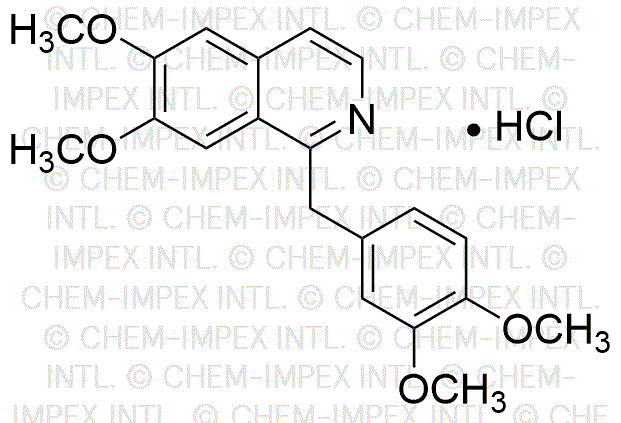Papaverine hydrochloride is widely utilized in research focused on:
- Vasodilation Therapy: Commonly used in the treatment of vascular disorders, it helps to relax and widen blood vessels, improving blood flow in conditions like peripheral vascular disease.
- Gastrointestinal Disorders: Employed to alleviate spasms in the gastrointestinal tract, making it beneficial for patients suffering from conditions like irritable bowel syndrome.
- Neurological Research: Investigated for its potential neuroprotective effects, it is being studied for applications in treating conditions like stroke and other neurovascular disorders.
- Pharmaceutical Formulations: Often included in combination therapies for its muscle-relaxing properties, enhancing the efficacy of other medications in pain management.
- Cardiovascular Studies: Used in clinical research to explore its effects on heart function and blood pressure regulation, providing insights into cardiovascular health.
Informations générales
Propriétés
Sécurité et réglementation
Applications
Papaverine hydrochloride is widely utilized in research focused on:
- Vasodilation Therapy: Commonly used in the treatment of vascular disorders, it helps to relax and widen blood vessels, improving blood flow in conditions like peripheral vascular disease.
- Gastrointestinal Disorders: Employed to alleviate spasms in the gastrointestinal tract, making it beneficial for patients suffering from conditions like irritable bowel syndrome.
- Neurological Research: Investigated for its potential neuroprotective effects, it is being studied for applications in treating conditions like stroke and other neurovascular disorders.
- Pharmaceutical Formulations: Often included in combination therapies for its muscle-relaxing properties, enhancing the efficacy of other medications in pain management.
- Cardiovascular Studies: Used in clinical research to explore its effects on heart function and blood pressure regulation, providing insights into cardiovascular health.
Documents
Fiches de données de sécurité (FDS)
La FDS fournit des informations de sécurité complètes sur la manipulation, le stockage et l’élimination du produit.
Spécifications du produit (PS)
Le PS fournit une description complète des propriétés du produit, notamment sa composition chimique, son état physique, sa pureté et les exigences de stockage. Il détaille également les plages de qualité acceptables et les applications prévues du produit.
Certificats d'analyse (COA)
Recherchez des certificats d'analyse (COA) en saisissant le numéro de lot du produit. Les numéros de lot et de lot se trouvent sur l'étiquette d'un produit, après les mots « Lot » ou « Lot de fabrication ».
Numéro de catalogue
Numéro de lot/série
Certificats d'origine (COO)
Ce certificat d'exploitation confirme le pays dans lequel le produit a été fabriqué, et détaille également les matériaux et composants utilisés et s'il est issu de sources naturelles, synthétiques ou autres sources spécifiques. Ce certificat peut être requis pour les douanes, le commerce et la conformité réglementaire.
Numéro de catalogue
Numéro de lot/série
Fiches de données de sécurité (FDS)
La FDS fournit des informations de sécurité complètes sur la manipulation, le stockage et l’élimination du produit.
DownloadSpécifications du produit (PS)
Le PS fournit une description complète des propriétés du produit, notamment sa composition chimique, son état physique, sa pureté et les exigences de stockage. Il détaille également les plages de qualité acceptables et les applications prévues du produit.
DownloadCertificats d'analyse (COA)
Recherchez des certificats d'analyse (COA) en saisissant le numéro de lot du produit. Les numéros de lot et de lot se trouvent sur l'étiquette d'un produit, après les mots « Lot » ou « Lot de fabrication ».
Numéro de catalogue
Numéro de lot/série
Certificats d'origine (COO)
Ce certificat d'exploitation confirme le pays dans lequel le produit a été fabriqué, et détaille également les matériaux et composants utilisés et s'il est issu de sources naturelles, synthétiques ou autres sources spécifiques. Ce certificat peut être requis pour les douanes, le commerce et la conformité réglementaire.


